HIT CHANNEL EXCLUSIVE INTERVIEW: September 2019. We had the great honour to talk with a legendary musician and composer: Dave Stewart. He’s one of the greatest 70’s progressive rock keyboard players playing in bands like Uriel (Arzachel), Egg, Khan, Hatfield and the North, National Health and Bruford. He has also collaborated with Robert Wyatt (Soft Machine, Matching Mole) and Colin Blunstone (The Zombies). Since 1981, he works with vocalist Barbara Gaskin, releasing top quality intelligent pop music as Stewart/Gaskin. In 2018, Stewart/Gaskin released their latest album titled “Star Clocks” . Read below the very interesting things he told us:
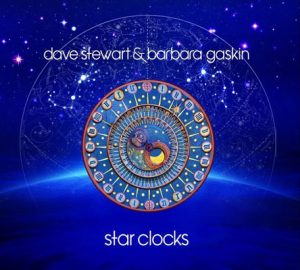 You spent many years working on “Star Clocks” album. Are you satisfied with the feedback you received so far for this album?
You spent many years working on “Star Clocks” album. Are you satisfied with the feedback you received so far for this album?
Yes, we had some very nice feedback. We have a mailing list of people who like our music and most of them buy a CD and they said some really nice things. Some people said that they thought that we had made progress in our music as it is developed. It’s hard for me to tell, in fact, if that’s the case. But certainly we are very happy with it and I think people really enjoyed it. We make the music that we enjoy and if other people enjoy it too, that’s great. You can’t really do more than that.
Do you consider “Star Clocks” a concept album?
No, not to me. To me, it’s a collection of songs which I wrote in quite a long period of time. They kind of have a loose relationship and some of the songs are very different from other songs. If you take for example “Everything Sings”, it’s a very quiet, sensitive ballad and then, on the other hand, you have “Afraid of Clowns”, which is almost like a heavy rock. So, they are very different and they are not part of the same concept. Every song stands on its own as a separate thing.
Even though you are a Chelsea FC fan, you wrote a song on “Star Clocks” about an old West Ham goalkeeper (“The Arms of Miklosko”). It’s a bit unusual choice, isn’t it?
(Laughs) Yes, I know, it’s a strange thing. My family grew up in London and both mother and father supported Chelsea, so it’s like a family thing. I used to go to Chelsea when I was a young boy, when I was about 9 or 10, my dad used to take me. I‘m not the kind of football fan that hates other teams. That’s not really my thing. Because having playing football, I know it takes two teams to make a good game. So, you can’t really go and hate the other team, because if they don’t show up, you won’t have a game. I always tend to support the London clubs: If Arsenal would play in Manchester City, I want Arsenal to win, because they are from London and so am I. West Ham, another good London club, they have always played really good football and contributed several players to the 1966 World Cup victory, which is the last time England won the World Cup. So, I was watching television one night and a football programme came on and West Ham would play. At some point into the game the commentator shouted (ed: He mimics the enthusiastic commentator) “And the ball falls through the air… and safe in the arms of Miklosko!” and I thought that’s a really good title: “The Arms of Miklosko”. So, I started writing a song about it.
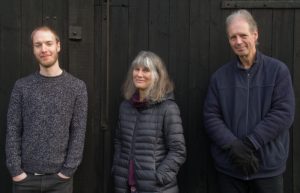 It’s a Stewart/Gaskin tradition to cover old hits. On “Star Clocks” you did “Summer In the City” (The Lovin’ Spoonful). How difficult is it to find a suitable song to cover?
It’s a Stewart/Gaskin tradition to cover old hits. On “Star Clocks” you did “Summer In the City” (The Lovin’ Spoonful). How difficult is it to find a suitable song to cover?
I usually think of one song that I would quite like to do, although over the years we have done so many covers. When we started, we did lots of covers and all our singles were cover versions, but gradually I’ve begun writing more and more my own songs and now it’s quite rare to want a cover version. But I can think of one or two that I would like to do and maybe I’ll do them, at some point, as there is no definite plan. But it’s something I enjoy doing, so it’s always a possibility and it’s never a difficulty. I mean, I wake up one day and somehow I think of this song: “Wow, this is great!” It’s always like a celebratory thing when we do it.
What is the secret of your lasting friendship and collaboration with Gavin Harrison (Porcupine Tree, King Crimson –drums), who also plays on “Star Clocks” album.
Gavin and I, have always got on well and we became close friends over the years. I first met him when he was 18, a really young guy and a mutual friend, Jakko (ed: Jakszyk – current King Crimson singer) introduced us; he actually played us the tape of Gavin playing. It was technically amazing doing this really intriguing fast stuff on the hi-hats. So, we realised he was an amazing drummer and we started asking him to play on Stewart/Gaskin songs and then I’ve always enjoyed his company. He’s a very thoughtful musician and also he’s got a really good sense of humour. So, we just hang out a lot over the years and I also go and visit him. In fact, now we live a long way from London, but I still make a point of going to see Gavin every so often because he’s a good friend. It’s always interesting talking to him about his ideas about music. So, the relationship with him goes quite a long deeper that I would normally do. He’s not just the session man, he’s actually a friend of Barbara and me.
How did you discover Beren Matthews (guitar)?
Ah Beren, interesting guy. Well, some friends were organizing a mini-festival and they wanted some bands. I always look around on the Internet for some bands in the West Country that I thought they would be suitable for the festival. In the West Country, there are a lot of cover bands who are all playing live AC/DC or Adele songs or whatever. I wanted someone who would maybe appeal to the younger people and be a bit original, because I think originality on music is really important and I found Beren’s band, Grip-Like Vice. They made a video for a song called “With the Band” and I thought it was a great song. I could see that they were funny guys, the video was very amusing. I called him up and I asked him to play this (ed: festival) gig. When the band had to play a gig, I went along and they were really-really good and I realised he was actually a really good musician.
So, I gave him one of the CD’s. I gave him a copy of “Broken Records – The Singles” and I was surprised that he saw interest in the music because he is a lot younger than us. I didn’t expect to be interested. He really liked one of the tunes, it was “The Emperor’s New Guitar”. He said: “I really like that one” and I asked him: “When can I come over and I ‘ll teach you the guitar parts?” So, I went to his studio and he played “The Emperor’s New Guitar” all the way through. There isn’t actually a guitar and he made up a really good part. He played all the keyboard lines and all the guitar parts and he played my music like there were 10.000 people. He really put everything into it. In the end of it, he put so much effort to play the song, he was actually shaking and I thought: “This guy has really got something”. I went back to his studio, sometime later and I started playing him. I said: “So, this is the music that we were thinking of recording. Just say how we ‘d get some when you can”. He got on really well. He can play all my fancy chords. He is good at singing and different voicings to play them on the guitar. Basically, I realised he was a really-really good guy and he became part of the band, really. He played on all the “Star Clocks” songs and he has played live with us too.
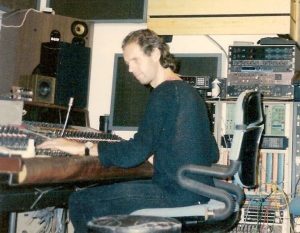 Is there still room for experimentation in intelligent pop?
Is there still room for experimentation in intelligent pop?
Yeah, yeah! No problem. Of course, there is always room for experimentation in all kinds of music. It’s up to the musicians to do it, but if they do it, they will probably find some listeners who appreciate it. It might not be such a big audience as if you do songs everybody knows and you do them in a familiar way; obviously you ‘ll get a big audience. It’s probably easier to make money that way. But if you do experimental music, I know for fact, there are a lot of people who want to hear it.
What fans should expect from the upcoming concerts in Japan in November?
We intend to play a mixture of music spanning our whole catalogue from 1981 to the present day. We are going to play songs from “Star Clocks”, songs from “Green and Blue” (2009) -actually just one song from “Green and Blue”. Songs from most of our albums. But also I’ve written five new songs that will be previewing for the Japanese listeners.
Did you expect that “It’s My Party” (1981) would become a #1 hit?
No way! No way! I was absolutely shocked that it was so popular. When we made a record, we did it for fun, we did it for a laugh. We thought it would be funny to record this song. Barbara did a really nice vocal and it just gave me a kind of kick to do it. It was such a different thing from what I have been doing. Prior to that track, I’ve done a song with Colin Blunstone (ed: The Zombies –vocals), it was a cover version of “What Becomes of the Broken Hearted” (1980) and that was a hit single and that was a big shock, as well. After that, I did “It’s My Party” with Barbara and when it got to #1, we just couldn’t believe it. It was like “Wow”! I have to say a lot of people assume that I made those records to make money, because they were hits. They think: “Oh yeah, Dave just wanted to make money” but to be really honest, I wasn’t thinking of making money. It was a struggle to get them released. Everybody turned down “What Becomes of the Broken Hearted”, most labels turned down “It’s My Party” and we were lucky that we hooked up with Stiff Records, who thought the singles were worth-releasing and they put them out. I think Stiff could recognize groups that were a little different. They weren’t just looking for the next huge pop sensation. They wanted bands to have some character, some originality, although we didn’t really fit with the rest of Stiff artists. The boss of Stiff thought those singles were good, gave us what we wanted and played his part in getting “It’s My Party” to #1. So yeah, it was astonishing, I still can’t actually believe it happened.
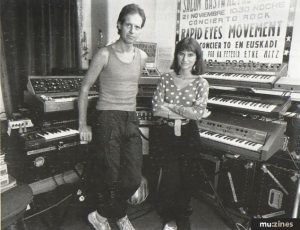 How did you come up with the idea to wear a boxer costume on the cover of “It’s My Party” (1981) single?
How did you come up with the idea to wear a boxer costume on the cover of “It’s My Party” (1981) single?
Making singles was a whole new thing for me and Barbara and we just thought it would be funny to dress up a bit for the photo session. I was in the West End of London, I was wandering about and I had no idea what I was going to do and suddenly I saw this strange costume in a shop, the clothing costume. I looked at the helmet and I said: “Can I try this on?” and then I tried the gloves on. I think it looks funny and Barbara did the same with these long fingernails. I think they come from Thailand. It just made us to look a bit silly, we thought it would be funny. Obviously, it wasn’t a serious thing.
I really like the song “Your Lucky Star” from “Spin” (1991) album, which is a tribute to record producer, Joe Meek. Later, you covered his most famous song, “Telstar”.
Yes, we did. I think it was the 40th anniversary of “Telstar” and I felt like doing my own version as a tribute. Joe Meek was a very interesting producer. He just did things he own way. He didn’t fit in with the rest of the record business. He was a bit like me, actually (laughs). I’m a bit of a loner. He had a very troubled life, unfortunately, which I haven’t had -I’m lucky that I have a fairly happy life. But poor Joe Meek ended up killing himself. He was unhappy, he was homosexual at a time when it was actually illegal to be a homosexual, so things were tough for him, but he did have an amazing sound that he got in his little studio. So, I thought it would be interesting to write something about him. That song (ed: “Your Lucky Star”) actually, it’s one of my favourite that we ever did.
You are also the boss of Broken Records. Does the business aspect distract you from creating more music?
It doesn’t help. It doesn’t help to make more music. It’s just helping to get things done. You have to organize your record releases and think about business stuff, percentages and manufacturing, but actually nowadays that’s made very-very easy for me because I have a great relationship with Burning Shed , a really good English company. They are a pleasure to do business with, they are very generous, they did really fair deals. They don’t like the idea of taking too much money away from musicians. They think musicians should get most of the money, they take commission for what they do, but the musician gets most of the money. I can always speak to them, anytime I can ring them in to discuss things, so it’s been a dream to work with them. I really recommend them for other bands, Burning Shed.
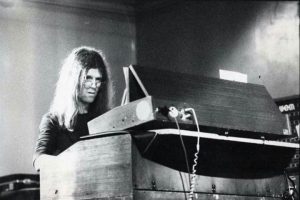 You did string arrangements on the new Opeth album, “In Cauda Venenum”. How much artistic freedom do you have when you work on other people’s music?
You did string arrangements on the new Opeth album, “In Cauda Venenum”. How much artistic freedom do you have when you work on other people’s music?
Depends on the artist. Mikael Akerfeldt gave me a lot of freedom on the Opeth songs. I have worked with him before and he said: “Just try some things” but he also sent me his own demo string arrangements that he had done, so I had an idea of the kind of thing that he wanted to hear. So, I was bearing in mind what Mikael wanted to hear in the first place. I tried to come up with a sort of compromise, really. I had to think a lot of approaches to what he had done. Working with other bands, some of them don’t even send me demos, they just say: “Do what you like, we don’t care”. If I work with Steven Wilson, he has always got a demo and sometimes he says to me: “Don’t change it, I really like it. Just arrange it for the live players”. So, all I have to do really is work out how to distribute the parts. Even then actually, I do come up with a few little ideas, I know that Steven never wanted drastic changes. Some things I ‘ve done for him, I ‘ve just tried things off my own bat, maybe some passages in the music that he didn’t do string demo for. I would try them out. Sometimes, he says: “Oh yeah, that’s great! We’ll use that”. At other times he says: “I don’t think that it works”. I do arranging. You know, you are hired to do what the artists want. All we come up with a happy compromise when doing those jobs.
Was it a natural decision for you to change your musical direction in 1981?
Yes, it was completely natural. It was just something I really felt like doing. When I started doing music, I used to play pop cover versions in a pop band, when I was about 15. I was always thinking of great old songs and I just thought that it would be really nice to play some of them. I started playing “What Becomes of the Broken Hearted” and it’s a lovely old song. I had a new synthesizer of appropriate size and it just made up some sounds. I played this big heavy riff in the intro and I worked out an arrangement and I found it so satisfying just to do that. And after a while, that was all I wanted to do: Just keep doing that. Of course, having success with my first two singles, it made me think that it wasn’t just me that liked it, other people liked it as well. So, it confirmed my belief that it was a worthwhile thing for me to do. But actually, I have to say it was completely instinctive. It came from inside me, I never thought intellectually: “Oh, you need to change style”. I just really wanted to play some of these nice old songs. That’s all it was.
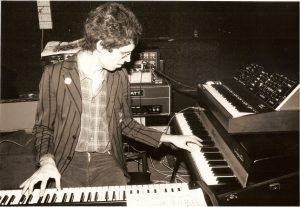 How much impact did The Nice concerts at The Marquee Club have on you as a student?
How much impact did The Nice concerts at The Marquee Club have on you as a student?
Yes, I was in secondary school at the time, I was in the City of London School. It had an enormous impact on me. Keith Emerson was just amazing and I could sit and watch him playing maybe like two yards away. I used to get there and queue up after school. We would show up at the club at about 5.00 and we would wait until 7.00. We would queue up for two hours, so we get the front row. So, they were a fantastic band. I loved his playing, I loved his sound and I really liked their songs. It had a huge influence on me for the rest of my life.
Is it frustrating when people sometimes mistake you for Dave Stewart from Eurythmics?
It’s quite funny. In fact, the other Dave Stewart from Eurythmics has suggested that we should make a record together (laughs).
I think you both have played on a Steve Hillage (solo, Gong, Khan, Uriel, System 7 – guitar) album.
Oh, that’s another Dave Stewart. That’s a third Dave Stewart. It’s a very common name. So, inevitably there are several Dave Stewarts wandering about. Mainly, I just have to remember which one I am and then I’ll be OK.
There are very few interviews of yours on the Internet. Does it happen because you are a big Mike Ratledge (Soft Machine –keyboards) fan?
I understand what you mean, now. Yes, I think he is not interested. I don’t do mainly because people don’t ask me nowadays, so I don’t do them.
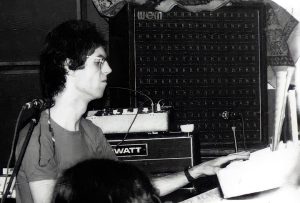 Did you get to know the members of Pink Floyd when Clive Brooks (Egg -drums) worked as Nick Mason’s drum tech?
Did you get to know the members of Pink Floyd when Clive Brooks (Egg -drums) worked as Nick Mason’s drum tech?
No, not really, although I had worked with Nick Mason on an earlier occasion. There was a Robert Wyatt concert. Do you know the album (ed: “Theatre Royal Drury Lane 8th September 1974”)? I got and met Nick then and he is a really nice guy. Then, when Clive began working for Pink Floyd and for Nick -he mainly was employed by Nick- I did actually bumped into Nick again. I went out to see Clive at Nick’s place and Nick was there, so I said: “Hi” and stuff. And sadly, the last time I saw him was at Clive’s funeral, which was a very sad day. But Nick was very generous to Clive and his family and I always thought he was a good guy. Also, he was in a band I thought they were fantastic, the early Pink Floyd with Syd Barrett, another big influence on me when I was young. I still love that first album they made. They were great, they were fantastic. I mean, that album “The Piper at the Gates of Dawn” (1967), it’s so original. There’s nothing like it. It was unique. Syd Barrett was the man. He was a visionary musician.
I think you have been to Lipsi, the Greek island. Did you enjoy your stay there?
Yes, very much. Also, we have been to Chalki on several occasions. We love the Dodecanese, we love the sea, we love the islands, we love the food and the friendly, very civilized and cultured Greek people. It’s my favourite place to go. If we can get some time off, in the summer, we love to go to Greece.
I’ve seen a 2006 photo of you with Dave Sinclair (Caravan –keyboards). Do you like his style as a keyboard player?
Yeah. He’s a wonderful keyboard player. Another influence on me, actually. When he played with Caravan, I would love his organ playing. It was really-really superb.
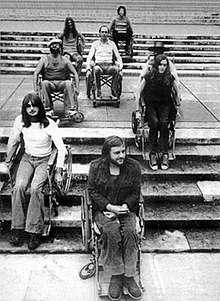 The last question it’s not about an old band. It’s about a live guest performance. What was it like to play on stage with my hero, Robert Wyatt, at the Theatre Royal, Drury Lane?
The last question it’s not about an old band. It’s about a live guest performance. What was it like to play on stage with my hero, Robert Wyatt, at the Theatre Royal, Drury Lane?
That was great, that was really good. Actually, there’s a funny story behind it. You know Robert had an accident and he’s in a wheelchair. So, he told me that he really didn’t want to do concerts after he had the accident, but Richard Branson of Virgin Records called us and he said: “Hey, I was just talking to Robert and he really wants to do a concert”. I said: “Oh yeah, really? Because he told he didn’t want”. “Oh no, no! He really wants to do it and he wants you to play the keyboards because you are his favourite keyboard player!” and I said: “Ok, fine”. What Branson did was that he called all the other musicians: Nick Mason, Mike Oldfield and he told them that Robert really wanted to do a concert, which he didn’t, actually (laughs). When we went to the first rehearsal, we all realised that Branson had kind of manipulated us into doing it, but by that stage Robert was very happy that we were all there and I loved working with him. He’s great, he’s very funny. He’s got a really good, refreshing, simple approach to music. It was great. Everything was really good fun.
There’s a photo of all of you in wheelchairs.
(Laughs) Yes, Richard Branson’s idea.
A huge “THANK YOU” to Mr. Dave Stewart for his time.
Buy the “Star Clocks” album here: https://burningshed.com/store/davebarb
Official Dave Stewart and Barbara Gaskin website: https://www.davebarb.com/
Official Dave Stewart and Barbara Gaskin Facebook page: https://www.facebook.com/Dave-Stewart-Barbara-Gaskin-171696959516360/

